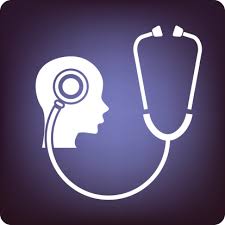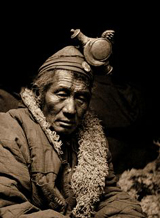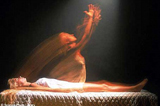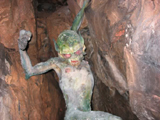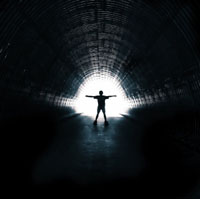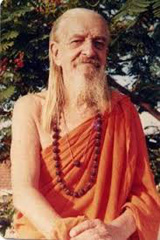Mental health
Knowledge frameworks in medicine and health
Abstract
A special problem is faced in the West, whereby people who have anomalous experiences were often assumed to have a mental health condition. However, survivors (of the mental health system) are rising up, claiming they want a more spiritual interpretation of their experiences. In the field of mental health in particular, problems result from an adherence to a dominant Western knowledge base, and its assumed ‘truth’ over cultural wisdoms. This article discusses the popular demand for a new paradigm for interpreting human experience. It explores cultural truths and presents examples of the urgent call for change in healthcare.
Introduction
A diverse range of knowledge frameworks exist within medicine and healthcare. Today, we face a dilemma in countries where Western opinions dominate cultural wisdoms. This is a particular problem in the West for those who have anomalous experiences or are considered to have symptoms of mental ill-health. This article explores the assumption that biomedical models of mental health are universal. It presents claimants, who suggest unusual experiences are spiritual phenomena and not indicative of pathology or mental ill-health. It explores the nature of ‘religious experiences’ and the assumptions around them. Finally it invites us to consider practical therapeutic examples from India, the UK and USA, which are being used today to address the dilemma of hierarchies of knowledge.
Popular demand for a new paradigm
In the West, people are demanding a new spiritual paradigm for psychiatry and healthcare. They claim allopathic models of health for extreme or ‘anomalous’ experiences are not universal and not working. Some are collecting evidence on perceived harm from psychiatric practice and pharmacology (1) . The call has gone out for different ways of addressing extreme experiences. At the same time, the biological origins of symptoms of mental distress are being questioned (2,3) as is the science behind medication reports (4,5).
In contrast, during visits to Mumbai in India, I observed physicians who already embodied the spiritual change the West would like to see. In addition, in my recent book, Spiritual Psychiatries, I also reported on medical, religious, and spiritual practices observed in Pondicherry, Tamil Nadu and Bengal (6).
What are anomalous experiences?
There are specialists who experience an expanded state of consciousness, but are able to deliberately switch it on and off at will. These may include healers, shamans, psychics, mediums, seers, clairvoyants, traditional doctors and gurus. They are able to tune into an altered state of consciousness and glean information for social or environmental well-being.
Unusual experiences, which cannot be switched off at will, are called by many different names, including mental ill-health. Other terms include ‘spiritual crisis’, ‘spiritual emergency’, ‘extreme ‘experience’, ‘shamanic vision’ or ‘spiritual awakening’. People who have them believe these experiences are profoundly transformative and are a route towards enlightened states of consciousness. These experiences may offer insight into reincarnation, spirit possession, clairvoyance or shamanic opening.
Extreme experiences can be visual, auditory or sensory and people who have them may feel as if they are receiving too much information, which becomes unmanageable or distressing. Those who experience this may feel as if they have data overload, whilst others cannot adjust to the flow of sensory experiences. Their mind feels like it is bombarded with inner experiences. They may also experience clairvoyance, extended numinosity and heightened awareness of reality. Sufferers may find it difficult to cope with daily life and feel out of touch with ordinary reality. They may disassociate and exist in a trance-like state. An individual who suffers extreme experiences, psychosis, hearing voices or seeing visions, may appear to have no on/off switch (7). Today, there is a global network of organisations supporting those who hear voices (8), or have extreme experiences.
Religious experiences
Then there are people who have spontaneous experiences, which have religious, mystical, spiritual, numinous, paranormal or clairvoyant aspects. These are transformational and differ from ordinary experiences (9). They may involve a kind of non-sensory apprehension of the Divine, which may manifest as transcendence or as coming from a higher power. They may or may not be benign. People experience extended perception, a wider reality beyond the ordinary and may have contact with angels or deceased relatives. These experiences start spontaneously and stop. They may or may not have a religious content; the phrase ‘religious experience’ is a catch-all term.
Included in this group are religious or mystical experiences, visions and presences of human or non-human beings. Others may experience what have been termed OBEs (‘out-of-body experiences’ (10) or NDEs (‘near-death experiences’ (11) or ELEs (‘end of life experiences’ (12). Some people, who appear to spontaneously switch dimensions into spiritualist realms and do not have an explanatory framework, may become confused and distressed. They may carry out negative actions, which they claim are influenced by voices or ‘other-than-human-beings’. In association with other factors, this may result in a psychiatric diagnosis.
In the 1970’s, Sir Alister Hardy collected 6,000 personal narratives from people who had claimed to have had a religious experience. Research was conducted on these archives: on the attitudes of people around those who had experiences, which was said to warrant psychiatric attention (not on the content of experiences themselves) (13). At that time, some respondents held the popular assumption that visionary religious experiences were a symptom of mental illness or schizophrenia. There was clearly a mismatch between popular and professional perceptions and popular misperceptions existed in spite of professional reassurance.
Academic differentiation
A curious phenomenon has occurred within academia, whereby anomalous experiences are defined differently by different disciplines. This makes it look as though each discipline is researching discrete experiences. The terminology for anomalous experience changes in each discipline. For example, Religious Studies departments conduct research into spontaneous religious and spiritual experiences, which are positive rather than negative (the latter are assumed to be mental ill-health). Transpersonal Psychology research may include studies of transcendence, altered states of consciousness, NDEs and OBEs (but not mental health experiences). Paranormal psychology may cover research into clairvoyance, telepathy, mediumship, psychedelia, and precognition. But they do not necessarily consider the lived experience they study as being similar to those who have suffered ‘mental ill-health’. Anomalous events such as NDEs, ELEs and OBEs have attracted the attention of psychiatrists, cardiologists and psychologists, but they don’t always compare these experiences to ‘mental ill-health’.
In contrast, Transcultural Psychiatry does cover social and cultural interpretation of conditions, but often re-frames these experiences within a medical context. In spite of the lack of evidence (14), mental health conditions are assumed to be diseases of the brain rather than a normal response to emotional trauma, cultural destruction or environmental disturbance.
Problems of non-collaboration
When academics do not collaborate on the lived qualities of an ‘anomalous’ experience, it can result in long-term negative influences on social well-being. It would make a profound difference to social health if scholars in different disciplines collaborated with each other and raise awareness on similarities of the nature of human experience. This is starting to happen (15). Western-trained psychiatrists may identify some human experiences as indicative of pathology, schizophrenia or psychosis, whereas I met professionals in India, who were more sympathetic to local interpretations (16). One psychiatrist felt the Western model of mental health did not fit Indian beliefs about the nature of human existence. He collaborated with a Muslim sage who diagnosed which patient required religious/spiritual treatments and who needed psychiatric help as well. He offered deliverance from discarnate beings and djinns and referred clients to the psychiatrist.
Call for a change
Today, amongst Indian populations, there is still a strong belief that mental well-being may be adversely influenced by the subtle-bodies of ancestors if prayers for the deceased are not performed. Some of us in the West may find it difficult to accept the presence of different types of vision, let alone different types of presence. It may be that medical and healthcare staff are culturally aware of subtle perceptions but may not mention this to their colleagues in Western clinical settings. In the West there is an assumption that only post-natal experiences can influence mental health. However the Indian model of mental health suggests a variety of different influences including pre-natal experiences, the role of planets, past lives, karma or spirit possession.
Good practice across the paradigms
Research is being done in the West by those who cross paradigm boundaries. The neuro-psychiatrist, Peter Fenwick conducted studies on death bed phenomena (17). He undertook research into ELEs and their impact on relatives and friends. The underlying assumption was that these visionary experiences and presences of deceased relatives were real and veridical and appeared to ease the passage of death. Also the physician, Dewi Rees, a medical director of a UK hospice, studied bereaved people who experienced a sense of presence of their deceased spouse. He said many people found the experience helpful, as though a continuing relationship existed between the living and the dead (18). The London psychiatrist Russell Razzaque is also crossing boundaries with his new book and research programme (19).
Crossing cultural chasms
In the field of medicine and healthcare, sometimes it feels as if we must cross the cultural chasms between our own (Western) understanding of health and indigenous wisdoms. The psychiatrist and anthropologist, Arthur Kleinman wrote:
“If you can’t see that your own culture has its own sets of interests, emotions, and biases, how can you expect to deal successfully with someone else’s culture?”(20).
He suggests we communicate with each other to acknowledge different models of body, life, and health. Although allopathic bio-medicine and clinical practice are powerful cultural beliefs, he claims social, religious or spiritual beliefs are equally powerful.
Plural frameworks of knowledge
The old underlying assumption was for psychiatrists and psychologists to follow a Western system of knowledge. However, this is changing now (21,22). Professionals are realising that there is more than one framework for understanding humanity (23). Although, in the Western world, apart from transcultural psychiatrists and transpersonal psychologists, medical and healthcare staff tend to accept the dominance of a Western model of mental health.
However, in India, I spoke to teachers of philosophy who were intellectually frustrated because they had direct experience of working within unequal hierarchies of knowledge: they considered that a dominant Western model of colonial philosophy prevailed (24). In Maharashtra, I interviewed Sri Gurudev who felt the philosophy of psychology taught in Indian universities was Western culture-bound:
“The treatment given by an American psychiatrist to his patient will be totally different from the treatment given by an Indian psychiatrist to his Indian patient. A system that is termed abnormal in America need not be abnormal here in our culture”(25).
The wisdom of Sri Aurobindo and the Mother helps us understand human existence from a more spiritual perspective.
Plural models of body and health
In India, medical and health professionals seemed to hold multiple models of body and health at the same time. They accepted that their patients used different practitioners for their treatment, and indeed referred them to religious and spiritual practitioners (26). A plurality of health-seeking strategies co-existed contemporaneously. The population’s interpretation of their symptoms and the meanings they gave both influenced the diagnosis they would accept and the treatment they were offered.
In places where a Western model of mental health is practised, there was usually one dominant model: a biological interpretation of symptoms, and subsequent treatment strategies that usually involved pharmacological solutions with a possibility of talking therapy. Although religion and faith were frequently acknowledged, these concerned rituals or calendars: discrete beliefs about human existence and health that co-existed at the same time were rarely mentioned. Globally in international healthcare, it would be very relevant for practitioners to become familiar with more than one framework of health and body, when working with patients from minority ethnic groups.
The call for change
In the West, there are groups emerging who want anomalous experiences to be interpreted and treated in more compassionate spiritual ways. It feels as if a tipping-point has been reached and gone over (27). The paradigm around old psychiatry is changing. In the USA, new practitioners include the Bay Area Mandala Project, which offers an innovative recovery system for mental wellness (28). They offer flexible, supportive environments, which are able to respond to a wide range of emotional states. A key resource for many people across the globe is the Mad in America website (29), which presents anti and critical psychiatry research. At Massachusetts in the USA, the Spiritual Emergence Network (30) (Grof Foundation) was set up to offer compassionate care to those who struggle to integrate a difficult psychedelic experience or psychological-spiritual crisis. Recently, a new group has surfaced on Facebook called Shades of Awakening (31). This was hugely supportive to those who’d had experiences but had been negatively diagnosed. In India there is the Bapu Trust for survivors (32).
There are other initiatives with international links: these include the UK’s Spiritual Crisis Network (33), which promotes understanding towards those going through profound personal transformation. The Open Dialogue approach was effective in Finland (34) and now there is a UK branch, which trains therapists, using reflection and authentic listening. Soteria is a network of people in the UK who promote a drug-free therapeutic strategy. Now they are part of an international movement. Also in the UK, there are the seminars I have developed for medical and healthcare staff to support them in re-framing their understanding of health, body and self. This Cultural and Spiritual Resource Training Pack was written as a bridge, a middle ground towards this paradigm change. The aim was to bring about positive change by opening a dialogue about cultural, spiritual and transpersonal models of health.
Summary
Plural models of body and health are acknowledged. In many societies across the world, a human being is believed to consist of both physical and non-physical components, some of which precede and survive death. In India, I discovered that the self is made up of pre-natal and extra-corporeal experiences as well as post-natal psychological responses. There is a groundswell of public opinion among those who want profound change within psychiatry: people who want their experiences recognised as spiritual and treated with appropriate resources accordingly. In addition, discrete academic disciplines which study religious and spiritual experiences must collaborate together around the topic of lived experiences, to explore commonalities. Western knowledge about health is just one model for addressing well-being, amongst many others: it is not superior, nor necessarily correct.
References
1. Whitaker R. Anatomy of an Epidemic: Magic Bullets, Psychiatric Drugs, and the Astonishing Rise of Mental Illness in America. New York: Broadway Books ; 2011.
2. Moncrieff J. The Myth of the Chemical Cure. Basingstoke: Palgrave Macmillan; 2008.
3. http://www.cchr.org.uk/finding-real-causes/ [Accessed 19th July 2015].
4. Whitaker R. Anatomy of an Epidemic. New York: Crown Publishers; 2010.
5. Moncrieff J. The Bitterest Pills: the troubling story of antipsychotic drugs. London: Palgrave Macmillan; 2013.
6. Tobert N. Spiritual Psychiatries. Virginia: Aethos; 2014.
7. Clarke I, Psychosis and Spirituality. 2nd ed. London: John Wiley & Sons; 2010.
8. http://www.hearing-voices.org/voices-visions/ [Accessed 19th July 2015].
9. Rankin M. Introduction to Religious and Spiritual Experience. London: Continuum; 2008.
10. Tart C. The End of Materialism: How Evidence of the Paranormal is Bringing Science and Spirit Together. Oakland : New Harbinger; 2009.
11. Parnia S. The Lazarus Effect: The Science That is rewriting the Boundaries Between Life and Death. London: Ebury Publishing. 2013.
12. Fenwick P, Lovelace H, Brayne S. Comfort for the Dying, Archives of Gerontology and Geriatrics. 2009 http://www.horizon research.org/Uploads/Comfort_for_the_ dying_PDF_ article.pdf [Accessed 19 th July 2015].
13. Tobert N. In-Sanity: Explanatory Models for Religious Experience. Wales: Religious Experience Research Centre. Occasional Paper no.3, Series 3, 2007.
14. Moncrieff J. A Critique of Genetic Research on Schizophrenia. Mad in America weblog 2014. http://www.madinamerica.com/2014/09/critique -genetic-research-schizophrenia-expensive -castles-air/ [Accessed 19 th June 2015].
15. http://www.northampton.ac.uk/research/psychology/the-centre-for-the-study-of-anomalous-psychological-processes-csapp
16. Tobert N. Spiritual Psychiatries. p. 35.
17. Fenwick P, Brayne S. End-Of-Life Experiences A Guide For Carers Of The Dying. Gloucestershire: Braynework ; 2008.
18. Rees D. Death and Bereavement : Psychological, Religious and Cultural Interfaces. London: John Wiley & Sons; 2001.
19. Razzaque R. Breaking Down is Waking Up. London: Watkins Publishing; 2014.
20. Kleinman A in (ed.) Fadiman A. The Spirit Catches You and You Fall Down. New York: Farrar Straus Giroux; 2012, p.273.
21. Critical Psychiatry, http://www.critical psychiatry.co.uk/index.php?option=com_ content&view=article&id=46:the-case-against-schizophrenia&catid=35: documents &Itemid=56 [Accessed 20 th July 2015].
22. Anti Psychiatry http://www.science museum. org.uk/broughttolife/techniques/ antipsychiatry.aspx [Accessed 20th July 2015].
23. Razzaque R. Breaking Down is Waking Up: Can Psychological Suffering be a Spiritual Gateway? London: Watkins Publishing; 2014.
24. Tobert N. Spiritual Psychiatries. p. 235.
25. Ibid., p. 240.
26. Ibid., p. 278.
27. Whitaker R, Cosgrove L. Psychiatry Under the Influence: Institutional Corruption, Social Injury, and Prescriptions for Reform, New York: Palgrave. 2015.
28. The Total Health Institute, http://www.the totalhealthinstitute.org/ [Accessed 20th July 2015].
29. Mad in America weblog, http://www.madina merica.com/about-us/[Accessed 20th July 2015].
30. Spiritual Emergence, http://spiritual emergence.info/ [Accessed 20th July 2015].
31. Shades of Awakening, https://www.face book.com/groups/1389895917996438/?fref=ts [Accessed 20th July 2015].
32. Bapu Trust in Pune, http://www.bapu trust.org / [Accessed 6th August 2015].
33. The Spiritual Crisis Network, http://spiritualcrisisnetwork.uk/ [Accessed 20th July 2015).
34. Open Dialogue Approach, http://opendialog ueapproach.co.uk/ [Accessed 20th July 2015].
Natalie Tobert is a medical anthropologist based in the United Kingdom.
Share with us (Comments,contributions,opinions)
When reproducing this feature, please credit NAMAH,and give the byline. Please send us cuttings.

